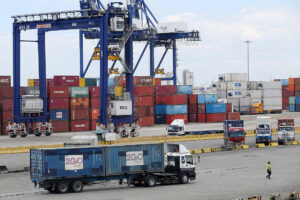Rejecting ICC probe could deter economic partnerships — analysts
THE PHILIPPINE GOVERNMENT’S continued rejection of the International Criminal Court (ICC) probe of its deadly drug war could deter other countries from pursuing economic partnerships with the Philippines, according to experts. “If most incumbent government officials have negative international press, the assumption is it deters confidence from international trading partners,” Hansley A. Juliano, a political […]

THE PHILIPPINE GOVERNMENT’S continued rejection of the International Criminal Court (ICC) probe of its deadly drug war could deter other countries from pursuing economic partnerships with the Philippines, according to experts.
“If most incumbent government officials have negative international press, the assumption is it deters confidence from international trading partners,” Hansley A. Juliano, a political economy researcher studying at Japan’s Nagoya University’s Graduate School of International Development in Japan, said in a Facebook Messenger chat.
The ICC in January reopened its probe of former President Rodrigo R. Duterte’s campaign against illegal drugs, saying it was not satisfied with the government’s efforts to probe human rights abuses.
The Hague-based tribunal on March 28 rejected the Philippine government’s plea to suspend the probe into the deadly drug war.
President Ferdinand R. Marcos, Jr. has called the ICC’s probe a threat to Philippine sovereignty, saying the it does not have authority to look into the reported human rights abuses.
Mr. Duterte had canceled the Philippines’ membership in the tribunal in 2018. Mr. Marcos said the Philippines would not rejoin the ICC, saying the Philippines has a functioning justice system.
“(Mr. Marcos’) rejection of further cooperation with the ICC will expose him as an unreliable economic partner, interested only in exacting economic benefits while rejecting values deemed important by various international partners,” Terry L. Ridon, a public investment analyst and convenor of think tank InfraWatch PH, said in a Facebook Messenger chat.
He said other economic partners may see the President’s commitment to the rule of law and human rights as mere lip service, in light of country’s non-participation in the ICC probe.
Mr. Ridon said the Philippines is at risk of losing its trade perks under the European Union’s (EU) Generalized Scheme of Preferences Plus (GSP+).
The EU makes GSP+ preferences and trade relations subject to Philippine adherence to a number of international conventions on human rights, labor rights, environmental protection, and illegal fishing, among others.
The European Parliament in February last year passed a resolution asking the Philippines to act on human rights abuses or face losing trade perks under the GSP+.
The arrangement, which will expire by yearend, allows the duty-free entry of 6,274 Philippine products to Europe.
Mr. Juliano also warned the Philippines’ investment grade credit ratings may be affected.
“Credit scores may also suffer if governance policies change and it affects international confidence,” he added.
The Philippines currently has a “BBB+” investment grade rating with “stable” outlook from S&P Global Ratings, and a “Baa2” rating with “stable” outlook from Moody’s Investors Service. It also has “BBB” rating with “negative” outlook from Fitch Ratings.
“If the Philippines persists with its present stand, it paints a negative picture of the issue of impunity in the country and may deter foreign engagement in the Philippines,” Ephraim B. Cortez, president of the National Union of Peoples’ Lawyers (NUPL), said in a Viber message.
Justice Secretary Jesus Crispin C. Remulla earlier told the United Nations Human Rights Council the Philippines could probe erring officials without the ICC’s help.
A delegation of EU lawmakers visited the Philippines in February to discuss the country’s human rights situation.
Hannah Neumann, vice chairwoman of the European Parliament subcommittee on human rights, told a press briefing in February that the EU wants to see the Philippines rejoin the ICC to reinforce its commitment to human rights. She said the human rights situation is better now under Mr. Marcos.
“The President cannot hope to further raise his international prestige if he rejects international human rights mechanisms such as proceedings in the International Criminal Court,” Mr. Ridon said.
Carol Claudio, the executive assistant of Presidential Communications Office chief Cheloy Velicaria-Garafil, did not immediately reply to a Viber message seeking comment. — John Victor D. Ordoñez














